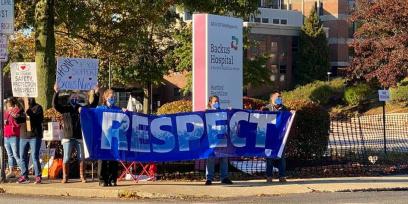Registered nurses at Backus Hospital in Norwich, Conn., launched a two-day strike on Oct. 13 over unfair labor practices by hospital management amid ongoing contract negotiations. The nurses rallied in the rain on day one and were joined by union leaders, including AFT president Randi Weingarten and elected officials who called on the hospital to negotiate a fair contract with the nurses.
The contract between the Backus Federation of Nurses/AFT Connecticut and the hospital expired in July. The nurses are bargaining over issues that affect patient care, workplace safety, and recruitment and retention. Nurses say the lack of respect at the bargaining table has strained negotiations.
“Management has tried to divide us, but nurses united will never be divided,” said Sherri Dayton, a nurse in the emergency room department and president of the Backus Federation of Nurses, which represents 415 nurses at Backus.
Dayton said that on the eve of the strike, she thought about what had brought the nurses to their decision. The facility was once an independent community hospital that was bought by Hartford HealthCare. “We went from a community hospital that was thriving and expanding and had our community at its base,” she said. At that time, patients were the priority; but now, the priority is the bottom line, added Dayton.
John Brady, vice president of AFT Connecticut and a charter member of the Backus Federation of Nurses, said the reason the nurses decided to form a union in 2011 was because of the changes at the hospital: “The hospital had changed; it wasn’t the community hospital we wanted it to be. It became a business, not a hospital, and we felt we had to do something, and we couldn’t do it alone. So we stood together, and in May 2011 we voted to form the Backus Federation of Nurses.”
The nurses are seeking competitive wages to increase retention and recruitment. Dayton said nurses at Backus make 14 percent less than their counterparts at the closest hospital, even though the Backus facility provides a higher level of care and is owned by the same corporation. The hospital has offered an increase in wages, but it is still not comparable to other facilities, said Dayton, who noted that the hospital has a high vacancy rate because of the pay disparity. Nurses come to the hospital fresh out of nursing school, and once they get their training, they go to other facilities, she added. “We are fighting to make sure our patients are getting what they need—and they aren’t, because we are losing nurses to more competitive hospitals.”
The COVID-19 pandemic has also caused division. Dayton explained that hospital policy calls for nurses at Backus to regularly reuse personal protective equipment like N95 masks, which they store in brown paper bags until the masks are soiled or compromised. In addition, testing is too slow. “Other organizations are using rapid tests that come back in hours, not days,” said Dayton. The testing process has improved from five days to 24 hours, but there have been several outbreaks of COVID-19 among nurses and other hospital workers throughout the pandemic. The nurses say the hospital has blamed them when they tested positive.
“There is no way that Backus Hospital can deal with a pandemic without you,” said AFT President Randi Weingarten, who took a break from the AFT Votes bus tour to stand in solidarity with the nurses. “It’s a pandemic. They should be protecting you, not blaming you.”
She said that although the nurses are picketing for wages, healthcare and staffing, they were also calling for respect. “It’s a strike for a basic issue of respect—this hospital needs to treat you like the heroes that you are,” said Weingarten.
“It’s hard to believe that this is happening during the worse pandemic in over 100 years, said U.S. Rep. Joe Courtney (D-Conn.) during the rally. “This is the time that we should be pulling together and getting the job done, not dividing us with an unfair position on a contract, which is simply looking for respect.”
“This outbreak of COVID-19 exacerbated every stress that healthcare was suffering through. Every nurse felt that stress down to their core,” said Shanon Pereira, a nurse in the cardiac telemetry progressive care unit at Backus. Pereira contracted COVID-19 because of an outbreak on her unit, and even though she took every precaution to prevent getting sick, the virus also spread to her family.
Backus management cited a lapse in proper use of PPE as the cause of the outbreak, which was upsetting for Pereira. “Reusing PPE until it’s broken or visibly soiled is the reason that my family and my co-workers became ill,” she said. “We deserve safety, protection and respect from Hartford HealthCare.”
“Nurses do not take the decision to strike lightly,” said Pereira. “We choose to strike only when it becomes a life or death situation for our patients. I would rather be at the bedside today caring for my patients, and we sincerely hope a mutual resolution can be reached; but we cannot allow unfair labor practices to continue,” she said. “We will not back down when it comes to protecting safe patient care. The future of healthcare and our community hospital is on the line here.”
[Adrienne Coles]


